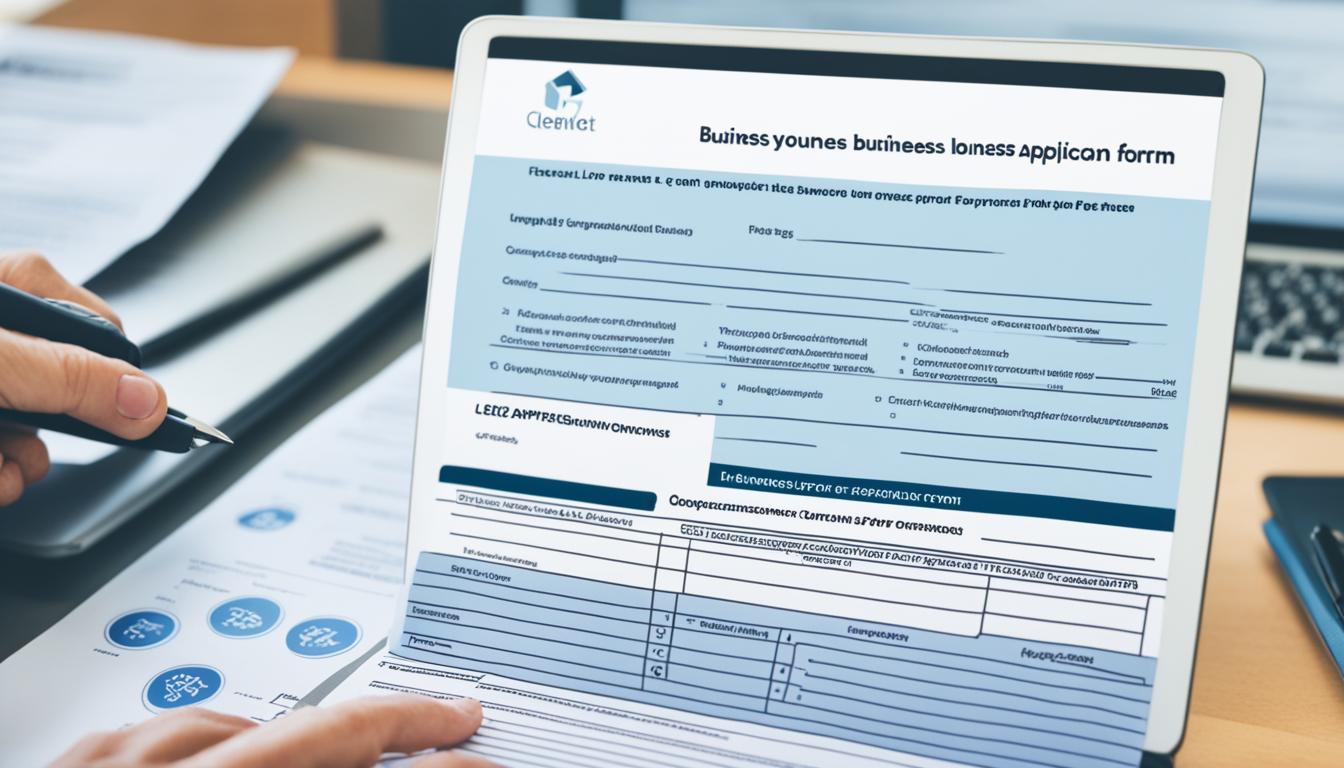How to Ace Your Business Loan Application and Expert Tips and Strategies
When it comes to applying for business financing, a successful loan application is crucial for securing the funds you need. Whether you’re a small business owner or an entrepreneur looking to start a new venture, understanding the loan application process is essential.
In this section, we will provide you with expert tips and strategies to help you ace your business loan application. From knowing the loan approval steps and understanding business loan eligibility to navigating the online business loan application, we’ve got you covered.
Applying for a business loan can be a daunting task, but with the right knowledge and preparation, you can increase your chances of success. By following these tips and strategies, you’ll be well-equipped to navigate the application process and present yourself as a strong candidate to potential lenders.
Key Takeaways:
- Understanding the loan application process is essential for a successful business loan application.
- Know the steps involved in loan approval to ensure you are well-prepared.
- Ensure your business meets the eligibility criteria before applying for a loan.
- Utilize online platforms for a convenient and efficient business loan application.
- Preparing your financial documents and having a solid business plan are key to impressing lenders.
How to Prepare for a Small Business Loan Interview
Preparing for a small business loan interview is crucial to make a strong impression on potential lenders. This section will provide tips on how to do your homework, know your financials, have a well-thought-out plan, and be prepared to answer questions during the interview. By following these steps, you can demonstrate your readiness and increase your chances of securing a loan.
1. Do Your Homework
Before the interview, research the lender thoroughly to understand their small business loan requirements and preferences. Familiarize yourself with their loan products, eligibility criteria, and application process. This will help you tailor your responses and demonstrate your alignment with their lending goals.
2. Know Your Financials
Be prepared to discuss your business’s financials in detail. Gather and organize necessary financial documents such as income statements, balance sheets, and cash flow statements. Understand key performance metrics such as revenue growth, profit margins, and cash flow trends. Having a clear understanding of your financials will showcase your business’s financial stability and ability to repay the loan.
3. Develop a Well-Thought-Out Plan
Outline a comprehensive business plan that highlights your company’s objectives, market analysis, competitive advantage, and growth strategy. Include a detailed plan for how you intend to use the loan funds and how it will contribute to the success of your business. A well-crafted plan will demonstrate your business acumen and the potential for a successful partnership with the lender.
4. Be Prepared to Answer Questions
During the interview, expect questions about your business, its financials, and the purpose of the loan. Anticipate queries regarding your industry, target market, competitors, and growth projections. Take the time to rehearse your answers to ensure clarity, conciseness, and confidence in conveying your vision and goals.
| Loan Interview Tips | |
|---|---|
| Research the lender and their loan requirements | |
| Gather and organize necessary financial documents | |
| Develop a comprehensive business plan | |
| Practice answering common interview questions |
5. Showcase Your Strengths
Highlight your business’s unique selling points, competitive advantage, and any notable achievements. If you have strong customer testimonials, media coverage, or industry awards, bring them to the interviewer’s attention. Demonstrating your strengths will boost your credibility and further convince the lender of your business’s potential.
6. Reflect Professionalism and Confidence
Arrive at the interview well-prepared, dressed professionally, and with a positive mindset. Project confidence by maintaining good eye contact, engaging in active listening, and speaking articulately. Show that you are serious about your business and value the opportunity to work with the lender.
Remember, the small business loan interview is an opportunity to showcase your business and convince lenders that you are a worthy investment. Prepare thoroughly, know your financials inside out, and exude confidence in your business’s potential. By following these steps, you can increase your chances of success in securing the loan you need for your small business.
What to Expect During a Small Business Loan Interview
Understanding the loan interview process is essential for small businesses seeking financing. By knowing what to expect, you can adequately prepare and increase your chances of success. During the loan interview, lenders will ask a series of questions to assess your business’s financial stability and your ability to repay the loan. This section will outline the typical small business loan interview process, discuss common loan interview questions, shed light on lender expectations, and explain the loan decision-making process.
Loan Interview Process
The loan interview process usually involves several steps, starting with the initial application and culminating in the lender’s decision. Here’s an overview of the process:
- Application: You’ll submit your loan application, which includes detailed information about your business, personal finances, and the purpose of the loan.
- Document Review: The lender will review your application and supporting documents, such as financial statements, tax returns, bank statements, and any collateral documentation.
- Interview: Once your application is reviewed, you’ll be invited for a loan interview. This interview allows the lender to delve deeper into your business’s financials and assess your ability to repay the loan.
- Evaluation: After the interview, the lender will evaluate your application, interview performance, credit history, and collateral value to determine the risk associated with approving the loan.
- Loan Decision: Based on the evaluation, the lender will make a decision on the loan. They may approve the loan, approve with conditions, or reject the application.
- Closing: If your loan is approved, you’ll proceed to the loan closing process, where final terms are agreed upon, and legal documents are signed.
Common Loan Interview Questions
During the loan interview, lenders will ask several questions to assess your business’s viability and your ability to repay the loan. Here are some common loan interview questions:
“Tell us about your business and its history.”
“What is the purpose of this loan?”
“How will you use the funds?”
“What is your business’s financial performance, including revenue, expenses, and profitability?”
“Do you have any existing loans or debt obligations?”
“What collateral can you offer to secure the loan?”
“What is your personal financial situation, including your credit history and personal assets?”
Lender Expectations
Lenders have specific expectations when evaluating small business loan applications. They want to ensure that the borrower can repay the loan, minimize the risk of default, and achieve a mutually beneficial outcome. Lenders typically expect:
- Demonstrated business viability and financial stability
- Good credit history and personal financial discipline
- Collateral or other assets for security
- A well-prepared business plan that outlines the purpose and use of the loan
- Reasonable and realistic financial projections
- Clear communication and transparency throughout the loan process
Loan Decision Process
After gathering all the necessary information, the lender will make a decision on whether to approve or reject the loan application. The key factors that influence the loan decision include:
- Assessment of your creditworthiness and financial stability
- Evaluation of your business’s cash flow and ability to generate revenue
- Review of collateral value and risk mitigation
- Analysis of the loan-to-value ratio and debt-to-income ratio
- Consideration of the loan’s purpose and alignment with the lender’s criteria

| Lender Decision Criteria | Weightage |
|---|---|
| Creditworthiness | 30% |
| Business Viability | 25% |
| Collateral | 20% |
| Financial Projections | 15% |
| Loan Purpose Alignment | 10% |
How to Answer Common Questions During a Small Business Loan Interview
Being prepared to answer common questions during a small business loan interview is essential. Lenders want to ensure that you have a clear understanding of your business and its financial standing. By anticipating these questions and providing concise and confident answers, you can impress the interviewer and increase your chances of securing the loan. Here are some common questions you may encounter during a small business loan interview:
- “Can you explain your business and its operations?”When answering this question, be prepared to provide an overview of your business, including its purpose, products or services offered, target market, and any unique selling points. Highlight the strengths of your business and how it differentiates itself from competitors.
- “What is the purpose of the loan?”This question aims to assess your intentions for the loan and how it aligns with your business goals. Be specific about how the loan will be used, whether it’s for expansion, purchasing equipment, hiring employees, or boosting working capital. Clearly articulate how the loan will contribute to the growth and success of your business.
- “What are your plans for repayment?”Lenders want to ensure that you have a feasible plan for repaying the loan. Prepare a clear repayment strategy that outlines how you will generate sufficient cash flow to meet the repayment obligations. This could include demonstrating a reliable revenue stream, outlining your budget, and discussing any contingency plans you have in place.
- “Can you provide information about your credit history?”Inquire about the specific credit information the lender requires. Be prepared to provide your personal and business credit scores, any past bankruptcies or foreclosures, and how you have maintained or improved your credit over time. Highlight any positive credit history and steps you have taken to mitigate any negative credit incidents.
- “What are your current financial obligations?”Lenders want to assess your existing financial commitments and ensure that you can handle additional debt responsibly. Prepare a list of your current monthly expenses, including lease payments, loan repayments, and other fixed costs. This will demonstrate your ability to manage multiple financial obligations and meet your loan repayment requirements.
When answering these questions, it’s crucial to provide clear and concise responses that showcase your knowledge, preparedness, and enthusiasm for your business. Practice your answers beforehand to ensure you sound confident and avoid rambling. Remember, a well-prepared and articulate interviewee is more likely to secure a small business loan.
How to Demonstrate Your Business’s Financial Stability During a Small Business Loan Interview
Demonstrating your business’s financial stability is crucial in a small business loan interview. It gives lenders the confidence that your business is financially secure and capable of repaying the loan. To showcase your financial stability, consider following these essential steps:
Know Your Numbers
Before the loan interview, familiarize yourself with your financial documents, such as financial statements and cash flow statements. Savvy lenders will want to see how your business is performing financially and analyze key metrics like revenue, profitability, and liquidity.
Show Evidence of Growth
Highlight your business’s growth and success by providing data and evidence of consistent financial growth. This can include year-over-year revenue growth, increasing customer base, or expanding market share. Such evidence demonstrates a positive trajectory and assures lenders of your business’s stability.
Have a Handle on Cash Flow
Strong cash flow management is crucial for your business’s financial stability. Be prepared to discuss your cash flow forecast, including revenue streams, expenses, and how you plan to manage working capital. Demonstrating an understanding of your cash flow helps reassure lenders that your business can handle loan repayments.
Create a Solid Business Growth Plan
Developing a comprehensive business growth plan exhibits your strategic foresight and commitment to future success. Outline your business objectives, target market, marketing strategies, and how the loan will contribute to achieving your goals. A solid growth plan emphasizes stability, growth potential, and a clear path to profitability.
“Lenders want to partner with businesses that have a history of financial stability and demonstrate a well-thought-out plan for growth.” – John Anderson, Chief Financial Officer, Venture Bank
By focusing on these steps, you can effectively demonstrate your business’s financial stability during the loan interview. Prepare thoroughly, present your documents professionally, and confidently articulate your business’s financial performance and growth prospects. Remember, showcasing stability and a well-rounded growth plan increases your chances of loan approval.
Essential Financial Documents for Loan Interviews
| Document | Description |
|---|---|
| Income Statement (Profit and Loss Statement) | An overview of your business’s revenue, expenses, and profit over a specific period. |
| Balance Sheet | Provides a snapshot of your business’s assets, liabilities, and equity at a given point in time. |
| Cash Flow Statement | Details your business’s cash inflows and outflows, reflecting the ability to manage liquidity effectively. |
| Business Plan | An in-depth overview of your business, including goals, market analysis, operations, and financial projections. |
Tips for Acing the Business Loan Interview
Acing the business loan interview is crucial for securing the financing your business needs. To increase your chances of success, follow these expert tips and strategies to prepare for a successful loan interview:
- Know Your Business Plan Inside-Out: Familiarize yourself with every aspect of your business plan. Be prepared to discuss your business goals, financial projections, marketing strategies, and any other relevant details. This will demonstrate your commitment and knowledge.
- Research the Lender and Interviewer: Prior to the interview, conduct thorough research on the lender and interviewer. Understand their lending criteria, their history with small businesses, and any recent news or updates. This will allow you to tailor your answers to their specific interests.
- Hold Mock Interviews: Practice makes perfect. Consider holding mock interviews with a trusted advisor, mentor, or colleague. This will help you refine your answers, improve your presentation, and build confidence.
- Have Relevant Documents and Visuals Prepared: Gather all the necessary documents and visuals to support your loan application. These may include financial statements, tax returns, business contracts, and a business plan summary. Organize them neatly so that you can easily refer to them during the interview.
- Exude Confidence: Confidence is key during a loan interview. Maintain a positive and professional demeanor throughout the interview. Speak clearly and concisely, and be prepared to explain any potential concerns or challenges that the lender may have. Your confidence will inspire trust and confidence in the lender.
By implementing these strategies and tips, you can increase your chances of acing the business loan interview and securing the financing your business needs to thrive.

Conclusion
Successfully navigating the business loan application process requires careful preparation and understanding of the lender’s requirements. By following the expert tips and strategies provided in this article, you can maximize your chances of a successful business loan application.
First and foremost, do your homework. Research and understand the loan application process, including the necessary steps and eligibility criteria. This will help you gather all the required documents and information in advance, saving you time and ensuring a smooth application process.
Next, know your financials inside out. Be prepared to provide accurate and up-to-date financial statements, including income statements and cash flow projections. Lenders want to see that you have a clear understanding of your business’s financial situation and the ability to manage the loan effectively.
In addition, having a well-thought-out business plan is crucial. Your plan should clearly outline your vision, objectives, and strategies for growth. It should also include a detailed explanation of how the loan will be used and how it will benefit your business in the long run.
Lastly, be prepared to answer questions confidently and concisely. Anticipate the common questions that lenders may ask and rehearse your responses. By demonstrating your knowledge and preparedness, you can impress the lender and increase your chances of loan approval.
Overall, by following these strategies – doing your homework, knowing your financials, having a solid business plan, and being prepared for questions – you’ll be well on your way to securing the financing you need for your business. Good luck!
